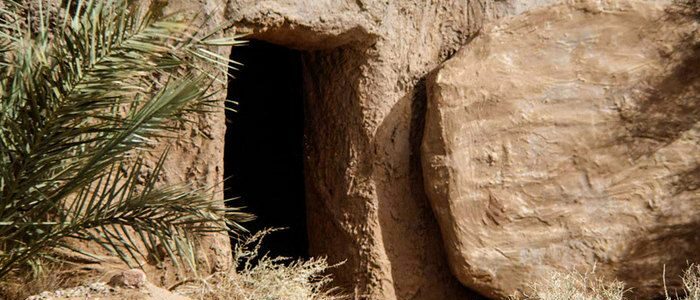We have just entered the holy season of Lent. Lent is a journey to Easter, but it is a journey to Easter through the cross. Lent reminds us that the road to Heaven passes through Calvary. There is no other way. There are no “cross-less Christians.” Jesus Himself said, “Whosoever doth not carry his cross and come after me, cannot be my disciple” (Luke 14:27).
Our whole earthly life is a journey to Heaven, which is our Homeland. This explains that feeling of what could be called “homesickness” we all experience. That feeling of restlessness and unease we have with our current “living arrangements.” A feeling as if we do not quite belong.
If Heaven is our final destination, the world and indeed no creature in it can never be our “end.” We know this all too well. Has any created thing ever really satisfied you? Or have you been left wanting more? Have you found not the fulfillment of a need, but rather simply an increase in that need? We spend most of our energy trying to satiate a thirst that simply cannot be satiated, save by the One who thirsts for our souls from the cross (John 19:28). This world cannot satisfy because we were made for another. This is not our home. As we pray in the O Salutaris Hostia before we adore the Blessed Sacrament: Oh, grant us endless length of days, in our true native land with Thee.
A word that sums up what our attitude should be as we live “en route” is “sojourn.” A sojourner is one who “spends the day” – who only visits for a brief time, a temporary stay. Listen to these words from the first letter of St. Peter: “Beloved, I exhort [you], as strangers and sojourners, to abstain from fleshly lusts, which war against the soul” (1 Peter 2:11). St. Peter makes clear that we are strangers to this world – aliens living not in our own country. We are sojourners – here for a short time, temporarily, just passing through. It is not our home. In fact, another translation of the word translated here as “sojourner” is “pilgrim.” Pilgrims (those on the way to a Holy Place) usually slept in tents. This image for our earthly life is profound – we live in tents on pilgrimage to a Holy Place. St. Paul refers to this world as a tent in his second letter to the Corinthians: “Once this earthly tent-dwelling of ours has come to an end, God, we are sure, has a solid building waiting for us, a dwelling not made with hands, that will last eternally in Heaven” (2 Corinthians 5:1).
So what should our lesson be? We should not be, or get, too comfortable. This earthly life is a temporary stop. We are merely “spending the day.” St. Paul makes this abundantly clear when he exhorts us, “Do not be conformed to this world” (Romans 12:12) or when He reminds us that, “Our conversation is in heaven, from whence we also look for the Savior, our Lord Jesus Christ” (Philippians 3:20). The word “conversation” found there is interesting. Conversatio is a difficult to translate Latin word, the most precise meaning of which is “way of life.” So, St. Paul is telling us that we ought to get our “way of life” from heaven, not from earth. We really should be living more like angels than animals, more in the spiritual than in the carnal. If we go beyond the Latin conversatio to the Greek word politeuma we find a word that means state or commonwealth. It was the word used to refer to Roman citizenship. There we see it again – our citizenship is in heaven, not earth. We are aliens here.
We need to live as if in tents. We need to live as people “on the move.” As God commands the Israelites in Egypt: “This is how you are to eat it: with your loins girt, sandals on your feet and your staff in hand, you will eat it in a hurry. It is the Lord’s Passover” (Exodus 12:11). We need to learn to live in such a way that we can leave everything behind. As Jesus says, “He that is on the housetop, let him not come down to take anything out of his house, and he that is in the field, let him not go back to take his coat” (Luke 17:31). Jesus exhorts us to store up our treasures in heaven and not on earth (cf. Matthew 6:19-21). We need to “hold on loosely” to the things of this world and even to the people we love. Some of Jesus’ most challenging words have to do with this. “He that loveth father or mother more than me, is not worthy of me; and he that loveth son or daughter more than me, is not worthy of me. And he that taketh not up his cross, and followeth me, is not worthy of me” (Matthew 10:37-38). Or in another place: “If any man come to me, and hate not his father, and mother, and wife, and children, and brethren, and sisters, yea and his own life also, he cannot be my disciple” (Luke 14:26). And in yet another: “And every one who has left houses or brothers or sisters or father or mother or children or lands, for my name’s sake, will receive a hundredfold, and inherit eternal life” (Matthew 19:29). In short, we need to live “detached” from the earthly and from all created things.
St. John of the Cross calls this way “Nada” – the Spanish word for “nothing.” This rugged path of “nothing” is the only road which leads to the summit of perfection. It is the one that not only rejects all disordered attachments to or inordinate use of the goods of earth, but even counts all earthly goods as “nothing.” St. Paul is the one who stated, “I count all things to be but loss for the excellent knowledge of Jesus Christ my Lord; for whom I have suffered the loss of all things, and count them but as dung, that I may gain Christ” (Philippians 3:8). He counted them as “dung” – let that sink in a moment. St. John of the Cross wrote: “In order to enjoy, know, possess, and be everything, desire to enjoy, know, possess and be nothing” (Ascent of Mount Carmel, Book I, Ch. 13, v. 11). The paradoxical truth is that the more we live detached, the more we actually enjoy our stay here on earth. It’s only when we seek to make a permanent abode that life becomes a movement from anxiety to anxiety. This has become more and more evident in our increasingly secular culture. It would seem that, for most, the world has become “all in all.”
So how do we break with the world? How do we live this detachment, this “Nada”? How do we, as St. Paul did, “in every circumstance and in all things learn the secret of being well fed and of going hungry, of living in abundance and of being in need” (Philippians 4:12)? How can we not be of the world while we are in it? How do we attain what St. Ignatius of Loyola called a “holy indifference” to all creatures and circumstances?
St. Peter, when he beseeched us as strangers and sojourners, exhorted us “to refrain from carnal desires.” St. Paul, when he discussed how our “way of life” is found in heaven laments those who have “become enemies of the cross of Christ, whose end is destruction, whose God is their belly, and whose glory is in their shame, who mind earthly things” (Philippians 3:19). St. Paul warns us: “If you live a life of nature, you are marked out for death; if you mortify the ways of nature through the power of the Spirit, you will have life” (Romans 8:13) and exhorts us: “Mind the things that are above, not the things that are upon the earth… You must [put to death] those passions in you which belong to earth” (Colossians 3:2). This earthly pilgrimage should be marked by self-denial, as Jesus said to all, “If any man will come after me, let him deny himself, and take up his cross daily, and follow me” (Luke 9:23).
And so, we fast. We pray. We give alms. We renounce the world, and hold on loosely to the things of it. We take up the cross.
This is journey ahead. This is the road to Heaven. There is no other way.
And Lent is here to remind us.
David Hajduk received his Ph.D. in Theology from Maryvale Institute in Birmingham, England, and wrote his dissertation on the thought of St. John Paul II. He is a teacher, speaker, pastoral minister, and award-winning author of God’s Plan for You: Life, Love, Marriage and Sex (Pauline Books & Media, 2006, 2018), a book for teens on the Theology of the Body. David is the Director of Theology for Array of Hope.










